Gorilla trekking is one of the most popular wildlife activities in Africa. It involves following a group of gorillas into the wild and observing them for one hour. Most people who have participate in it find it to be an experience of a lifetime. The activity not only offers you access to the primates, it also exposes you to the pristine jungles of Africa and all its hidden creatures. This article will focus on mountain gorillas but the information applies to all gorilla subspecies living in the wild. Mountain gorillas are only found in three countries in the world – Congo, Rwanda and Uganda.
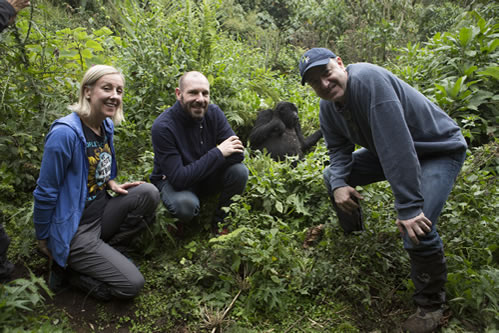 Gorilla trekking is what draws most tourists to these countries at the moment. One of the things that make gorillas uncomfortably fascinating is that they look, behave and organize themselves like we humans. Gorillas share about 98 % of their DNA with us. Mountain gorillas attract more tourists because they are endangered and only about 1000 remain in the wild. Mountain gorillas cannot be observed in zoos like their cousins the Western lowland gorilla. Although there are over 250,000 western lowland gorillas, fewer tourists visit them because they are commonly seen in zoos. Western lowland gorillas also live in very remote parts of Africa which are hard to reach or with poor tourism infrastructure.
Gorilla trekking is what draws most tourists to these countries at the moment. One of the things that make gorillas uncomfortably fascinating is that they look, behave and organize themselves like we humans. Gorillas share about 98 % of their DNA with us. Mountain gorillas attract more tourists because they are endangered and only about 1000 remain in the wild. Mountain gorillas cannot be observed in zoos like their cousins the Western lowland gorilla. Although there are over 250,000 western lowland gorillas, fewer tourists visit them because they are commonly seen in zoos. Western lowland gorillas also live in very remote parts of Africa which are hard to reach or with poor tourism infrastructure.
Why allow people near mountain gorillas if they are endangered? The answer is that gorilla tourism is the only way to save the primates. By allowing tourists visit the primates, the much needed funds for protecting them can be collected. Tourism also benefits communities living close to the forests and helps them appreciate the importance of having the gorillas around. If there was no tourism money, the governments in the three countries would have difficulty protecting the primates and they would be left at the mercy of poachers. For most of these developing countries, the funds required to protect the park and pay Rangers can only be generated through tourism.
Although tourists are allowed to observe the primates in their natural environment, strict measures have been put in place to ensure that the primates are not disturbed in their natural habitat. Only 8 people can visit a gorilla group in a day. There are also strict rules for gorilla trekking which all participants are 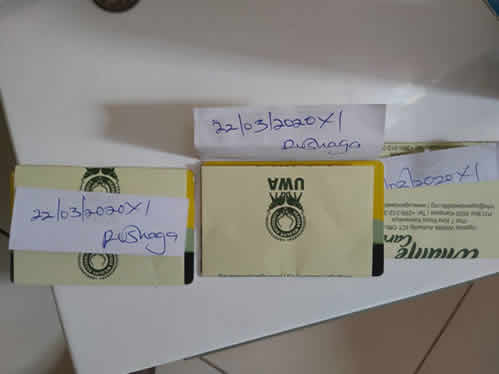 required to follow while out in the forest. Apart from the rules for gorillas trekking, the authorities in the three countries introduced gorilla permits to limit the number of people visiting the park. A gorilla permit is a pass or card which allows tourists to observe gorillas for one hour in the wild. Without a gorilla permit, a tourist cannot take part in gorilla trekking in Bwindi or any other destination. Gorilla permits are issued by wildlife management authorities in the three gorilla countries. In Uganda, the Uganda wildlife Authority is responsible for issuing out gorilla permits while in Rwanda the Rwanda Development Board (RDB) does the job. The Virunga Foundation is responsible for issuing out permits in the Democratic Republic of Congo. The process of buying or booking gorilla permits is similar in the three countries but there are some differences as we will see in the following paragraphs.
required to follow while out in the forest. Apart from the rules for gorillas trekking, the authorities in the three countries introduced gorilla permits to limit the number of people visiting the park. A gorilla permit is a pass or card which allows tourists to observe gorillas for one hour in the wild. Without a gorilla permit, a tourist cannot take part in gorilla trekking in Bwindi or any other destination. Gorilla permits are issued by wildlife management authorities in the three gorilla countries. In Uganda, the Uganda wildlife Authority is responsible for issuing out gorilla permits while in Rwanda the Rwanda Development Board (RDB) does the job. The Virunga Foundation is responsible for issuing out permits in the Democratic Republic of Congo. The process of buying or booking gorilla permits is similar in the three countries but there are some differences as we will see in the following paragraphs.
Cost of Gorilla Permits in Rwanda
Gorilla permits in Rwanda are issued by the Rwanda development board. A tourist may get one through one of the board offices, the Volcanoes National Park or their official website. Most tourists organize 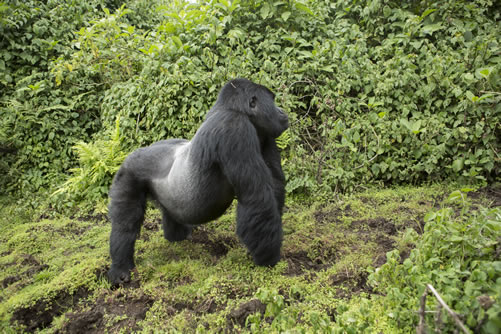 their gorilla tours through a tour operator. The tour operator secures the permit from the Rwanda Development Board and also arranges accommodation, transport and meals. A gorilla permit in Rwanda goes for $1500 regardless of the tourism season. The cost of gorilla trekking is higher than anywhere else. The permit in Rwanda is a paper document with the client’s details or the name of the tour company. It is signed and stamped by the board permitting the tourist to track the gorillas. Rwanda has 12 habituated gorilla families and only 8 people are allowed to track each family in a day. This implies that there are 96 gorilla permits available for tourists per day in Rwanda. What are the chances of seeing the primates. The chances of seeing mountain gorillas in Rwanda is 100%, however the high cost of gorilla trekking in the Volcanoes National Park has forced many tourists to go to Uganda or Congo. You can also read about discounted gorilla permits in Rwanda.
their gorilla tours through a tour operator. The tour operator secures the permit from the Rwanda Development Board and also arranges accommodation, transport and meals. A gorilla permit in Rwanda goes for $1500 regardless of the tourism season. The cost of gorilla trekking is higher than anywhere else. The permit in Rwanda is a paper document with the client’s details or the name of the tour company. It is signed and stamped by the board permitting the tourist to track the gorillas. Rwanda has 12 habituated gorilla families and only 8 people are allowed to track each family in a day. This implies that there are 96 gorilla permits available for tourists per day in Rwanda. What are the chances of seeing the primates. The chances of seeing mountain gorillas in Rwanda is 100%, however the high cost of gorilla trekking in the Volcanoes National Park has forced many tourists to go to Uganda or Congo. You can also read about discounted gorilla permits in Rwanda.
Booking a Gorilla Permit in Uganda
Uganda has two national parks where mountain gorillas can be observed in the wild. The two parks are Bwindi and Mgahinga. Bwindi forest alone has almost half of the overall population of mountain gorillas living in four different sectors. If one is tracking in Bwindi, they need to know which sector they will be tracking from. Gorilla permit reservation can be done both online and offline. The client can contact the Uganda Wildlife Authority through their website or directly from their office in Kampala and make a reservation. Most clients book their gorilla permit through a local tour operator. This is because the client may also be planning to take part in other wildlife activities. You also need to book accommodations, transport and permits for other activities. Booking everything on your own may be very confusing if you are not familiar with Uganda. A tour operator can help you book everything and leave you with the task of showing up. A good tour operator may get you permits even when they seem finished on a particular day.
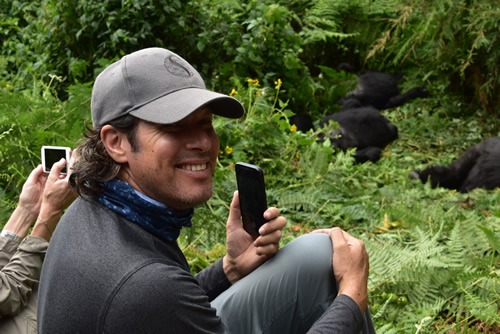 Gorilla permits in Uganda costs $700 per person. Discounted Gorilla Permits in Uganda are rare though one may get lucky due to the current COVID-19 pandemic. A gorilla permit is a card with a chip containing information about the client/Tour company, national park, sector and the date when to track the gorillas. The tourist must present this card at the park office on the day of the trek along with their Identity card. Uganda has 17 habituated gorilla families. 16 groups are found in Bwindi impenetrable park and 1 one in Mgahinga national park. Uganda also has 4 gorilla groups reserved for the gorilla habituation experience. These 4 groups are not very used to humans and are still undergoing the 3-year habituation process. Uganda is currently the only country in the world where tourists can take part in the gorilla habituation process. In the gorilla habituation experience, visitors spend four hours with the gorillas after locating them. A Gorilla Habituation Permit costs $1500. Overall, 152 people are tracking gorillas on a given day in Uganda. Uganda has a lot of potential to receive more visitors because most gorilla groups are not habituated.
Gorilla permits in Uganda costs $700 per person. Discounted Gorilla Permits in Uganda are rare though one may get lucky due to the current COVID-19 pandemic. A gorilla permit is a card with a chip containing information about the client/Tour company, national park, sector and the date when to track the gorillas. The tourist must present this card at the park office on the day of the trek along with their Identity card. Uganda has 17 habituated gorilla families. 16 groups are found in Bwindi impenetrable park and 1 one in Mgahinga national park. Uganda also has 4 gorilla groups reserved for the gorilla habituation experience. These 4 groups are not very used to humans and are still undergoing the 3-year habituation process. Uganda is currently the only country in the world where tourists can take part in the gorilla habituation process. In the gorilla habituation experience, visitors spend four hours with the gorillas after locating them. A Gorilla Habituation Permit costs $1500. Overall, 152 people are tracking gorillas on a given day in Uganda. Uganda has a lot of potential to receive more visitors because most gorilla groups are not habituated.
Price of Congo Gorilla Permits
Gorilla permits in Congo are issued by the Virunga foundation. A tourist can book the permit directly from the park authorities or through a tour operator. Booking gorilla permits in Congo isn’t straight forward and you are better off using the services of a good tour operator. There are two subspecies of mountain gorillas in the Democratic Republic of Congo. You can also choose to do eastern lowland gorilla trekking in Kahuzi Biega National Park. Gorilla permits in Congo cost $450 but can go lower during low seasons.
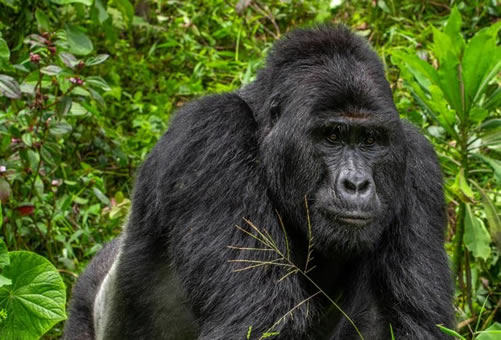 Why are gorilla permits expensive? Gorilla permits are expensive for various reasons. One is that gorilla trekking is very popular and on high demand. To overcome the problem of overcrowding and destruction of gorilla habitat, the three governments realized that the only effective way was to increase the price of permits. Other control measures are very difficult to implement in developing countries because of corruption and weak systems. The governments also need funds for conservation related activities and to pay salaries of Rangers patrolling the parks. The price of a gorilla permit includes park entrance fees but doesn’t include transport, accommodation, meals, air tickets, visas, tips to the park rangers, porters for your luggage or personal expenses.
Why are gorilla permits expensive? Gorilla permits are expensive for various reasons. One is that gorilla trekking is very popular and on high demand. To overcome the problem of overcrowding and destruction of gorilla habitat, the three governments realized that the only effective way was to increase the price of permits. Other control measures are very difficult to implement in developing countries because of corruption and weak systems. The governments also need funds for conservation related activities and to pay salaries of Rangers patrolling the parks. The price of a gorilla permit includes park entrance fees but doesn’t include transport, accommodation, meals, air tickets, visas, tips to the park rangers, porters for your luggage or personal expenses.
Additional information about Booking a Gorilla Permit
Only travelers who are 15 years and above may be issued with a gorilla permit. Gorilla permits are issued on a first come first served basis. You will be requested to share your passport details to confirm if you are eligible for the activity and if your names match those on the permit. Even if your tour operator books on your behalf, you will still be asked for the documents. Payments for the permit can be made using your credit card if you are booking directly with the government authority. If you are booking though a tour operator, you can pay by credit card or their bank transfer. Never make payments to individual accounts. All tour companies have accounts and provisions for credit card payments which can only be acquired if one is registered.
If you choose to book your gorilla permit through a tour operator, they will ask for a copy of your passport. This will help them confirm your eligibility and also while processing the permit with the responsible governmental authority. It is important to reserve/book gorilla permits as early as possible. The best time to reserve a gorilla permit is six months before your safari. Reserving early is especially important if you are planning to travel during the peak tourism seasons (June to October and December to March). During the peak season, it becomes very difficult to acquire a permit.
Gorilla Permit Cancellation Policy and Penalty in Uganda
What are the cancellation policies for gorilla permits? A traveler has to bear in mind that once permits are paid for, the Uganda Wildlife Authority does not make 100% refund. This is because some expenses are incurred (administratively) while processing the permit. The Uganda Wildlife Authority deducts a certain amount depending time they received a notification of your cancellation and when the trip is planned to start. If the traveler cancels the trip 3 months in advance, they will be refunded 75% of the total gorilla permit fee. If the traveler makes a cancellation within 46 to 90 days before the trip, he/she is entitled to a refund of 50% of the gorilla permit fees. From 45 days to 9 days before the trip, the traveler is given back 25% of the total amount paid for the gorilla permit. From 8 to 0 days before the trip, no refund is given. It is important to note that the cancellation policy above applies to the Uganda Wildlife Authority. Tour operators may apply their own policy in case of a cancellation.


